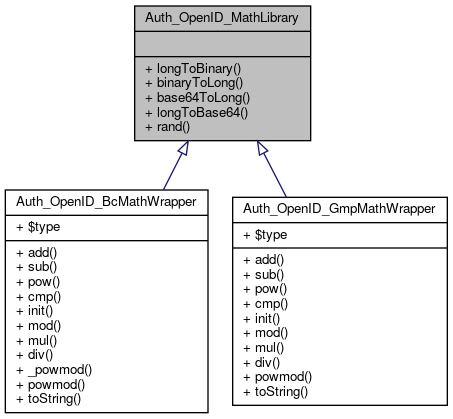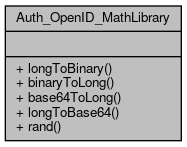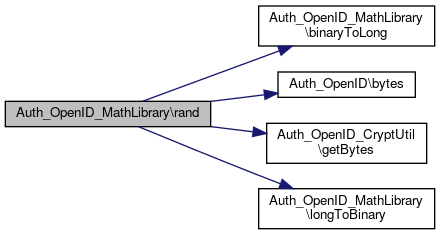 Inheritance diagram for Auth_OpenID_MathLibrary:
Inheritance diagram for Auth_OpenID_MathLibrary: Collaboration diagram for Auth_OpenID_MathLibrary:
Collaboration diagram for Auth_OpenID_MathLibrary:Public Member Functions | |
| longToBinary ($long) | |
| Given a long integer, returns the number converted to a binary string. More... | |
| binaryToLong ($str) | |
| Given a binary string, returns the binary string converted to a long number. More... | |
| base64ToLong ($str) | |
| longToBase64 ($str) | |
| rand ($stop) | |
| Returns a random number in the specified range. More... | |
Detailed Description
Definition at line 33 of file BigMath.php.
Member Function Documentation
◆ base64ToLong()
| Auth_OpenID_MathLibrary::base64ToLong | ( | $str | ) |
Definition at line 112 of file BigMath.php.
References binaryToLong().
 Here is the call graph for this function:
Here is the call graph for this function:◆ binaryToLong()
| Auth_OpenID_MathLibrary::binaryToLong | ( | $str | ) |
Given a binary string, returns the binary string converted to a long number.
- Parameters
-
string $binary The binary version of a long number, probably as a result of calling longToBinary
- Returns
- integer $long The long number equivalent of the binary string $str
Definition at line 86 of file BigMath.php.
References $n.
Referenced by base64ToLong(), and rand().
 Here is the caller graph for this function:
Here is the caller graph for this function:◆ longToBase64()
| Auth_OpenID_MathLibrary::longToBase64 | ( | $str | ) |
Definition at line 123 of file BigMath.php.
References longToBinary().
 Here is the call graph for this function:
Here is the call graph for this function:◆ longToBinary()
| Auth_OpenID_MathLibrary::longToBinary | ( | $long | ) |
Given a long integer, returns the number converted to a binary string.
This function accepts long integer values of arbitrary magnitude and uses the local large-number math library when available.
- Parameters
-
integer $long The long number (can be a normal PHP integer or a number created by one of the available long number libraries)
- Returns
- string $binary The binary version of $long
Definition at line 45 of file BigMath.php.
Referenced by longToBase64(), and rand().
 Here is the caller graph for this function:
Here is the caller graph for this function:◆ rand()
| Auth_OpenID_MathLibrary::rand | ( | $stop | ) |
Returns a random number in the specified range.
This function accepts $start, $stop, and $step values of arbitrary magnitude and will utilize the local large-number math library when available.
- Parameters
-
integer $start The start of the range, or the minimum random number to return integer $stop The end of the range, or the maximum random number to return integer $step The step size, such that $result - ($step - N) = $start for some N
- Returns
- integer $result The resulting randomly-generated number
Definition at line 142 of file BigMath.php.
References $n, binaryToLong(), Auth_OpenID\bytes(), Auth_OpenID_CryptUtil\getBytes(), and longToBinary().
 Here is the call graph for this function:
Here is the call graph for this function:The documentation for this class was generated from the following file:
- Services/OpenId/lib/Auth/OpenID/BigMath.php







